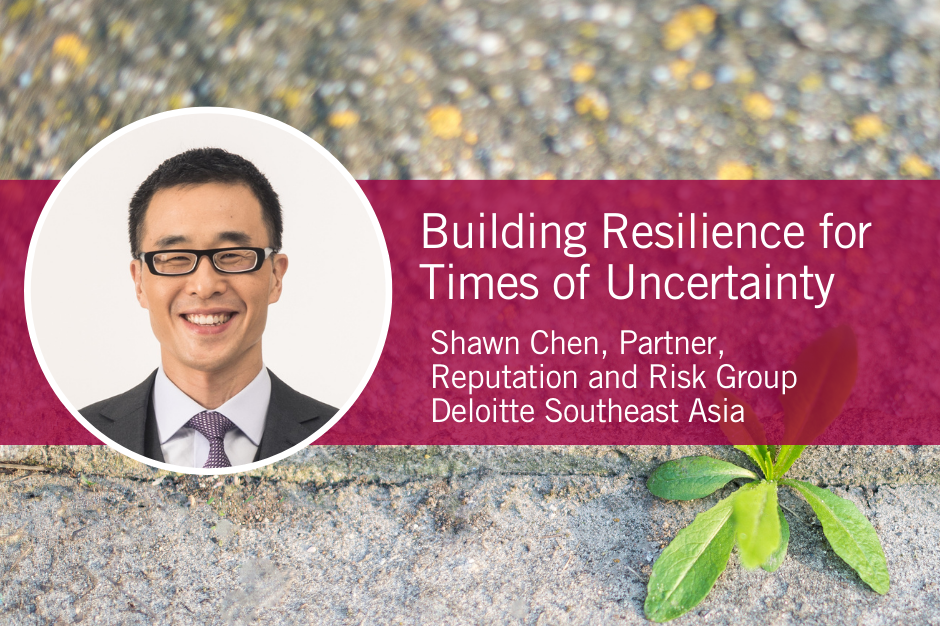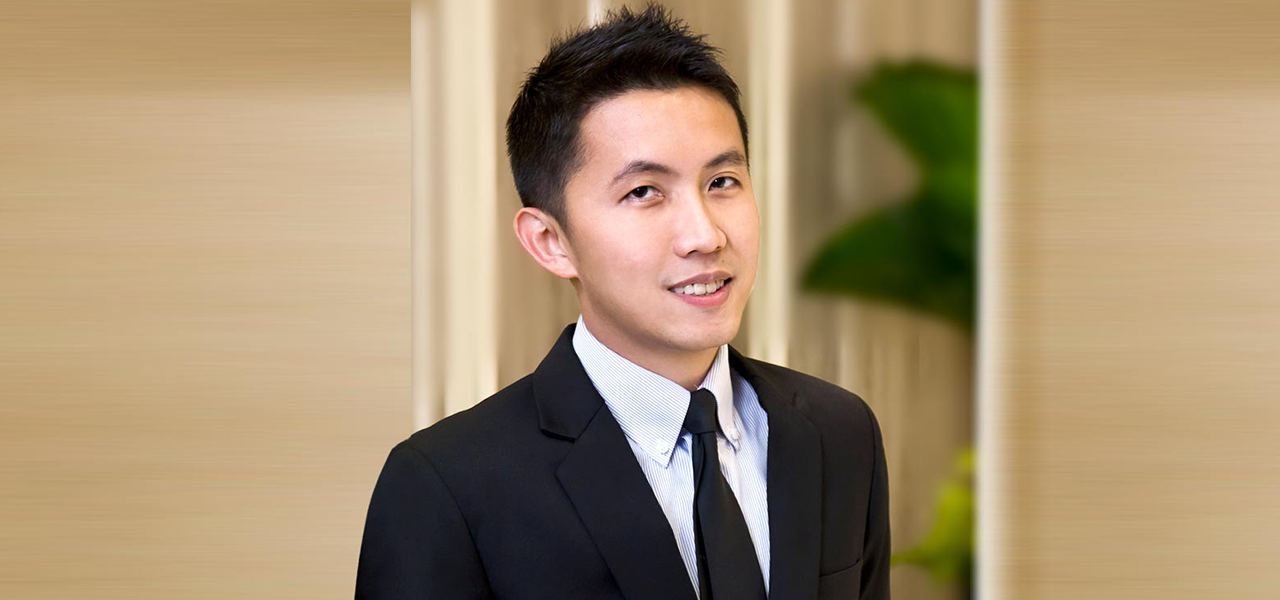Industry Talk: Building Resilience For Times of Uncertainty
Hard work, patience and staying relevant were just some of the key takeaways at the recent SMU Accounting Masters Industry Talk Series titled Enhancing Your Capabilities With A Master of Professional Accounting, with MPA alumni Shawn Chen, Partner, Reputation and Risk Group at Deloitte Southeast Asia.
Hailing from a legal background, Mr. Chen decided to embark on the next phase in his journey of personal growth by applying for SMU’s MPA programme, which was in line with his interest in enhancing his expertise with further specialist qualifications. “As a professional who was used to learning matters in-depth and intending to continue in such a role (as a professional), I thought it was important to seek specialisation and depth rather than breadth. This is why I chose to do the MPA rather than an MBA; the MBA makes sense for entrepreneurs who must have an understanding across a wide range of business areas but specialists develop technical understanding in order to be able to share expertise in his or her chosen discipline.
For Mr. Chen, accounting was a way to supplement his legal expertise, bridge gaps in his knowledge, and build on his expertise as a lawyer, as he explained, “I was a legal specialist in the capital markets. A capital market transaction requires many experts to take it to completion – experts within the company of its own business, lawyers to advise on disclosure and the law, bankers who project manage and advise the company on the right investment structure, and connect the company with the investing community to ensure the market will buy the instrument the company is selling.
“Then there are the auditors, the accountants, who opine on the financial statements and may be asked to provide certain assurances regarding the financial information of the company. I thought the MPA programme would help me understand the financial information of the company, to appreciate this common language of business and better appreciate the work of auditors and accountants.”
However, as a working professional, taking up a specialist degree in accounting came with its own set of challenges, Mr. Chen revealed.
“Accounting is interesting but learning the fundamentals, in the beginning, can be very dry. It’s technical and requires time to comprehend, and it often made me wonder why I was doing it (the MPA). Here I was working until 7.30pm to finish work and being late for class which went on to 1030pm, and I would be so tired at the end. Then on weekends, while my friends were relaxing I was studying and preparing for my projects,” he recalled.
Still, he stayed the course and found the modules in the programme – such as management accounting, basic financial accounting and advanced financial accounting – to be very useful, “the professors gave us a very good appreciation of the financial modules and I am now enabled to do my own work better – whether in interactions with the business teams, financial professionals, or for you, serving in an actual finance role, in business development or in internal audit – you will find accounting useful because it is a common language of business. This common language will help you build bridges across different areas and enable you to understand problems and issues, and perform your own role more effectively, ” Mr. Chen said.
This mindset of resilience and personal growth, to overcome challenges, is one that can take students far in their careers, he affirmed.
“For students of today, my advice is to not be afraid of hard work when you are in the working world. Don’t shy away from joining the Big Four (or any organisation for that matter) just because of a fear of hard work. Of course there are long hours and it is difficult if you want to be recognised as a specialist and as a professional.
“The next thing I would ask students to think about is being patient [for success]. I get the impression that most of us come into a profession thinking that we’re going to be involved in the biggest, most exciting stuff, instead of say, counting inventory in a warehouse, but don’t be afraid of doing that. Because that is part of building your own foundation for you to be good at your work later,” he said.
Mr. Chen shared from his own experience, telling the audience he had once spent two weeks in a small room to arrange documents in chronological order, “I was so frustrated and I imagined I should have been arguing important cases before a court instead.’ But that experience humbled me, and it taught me to manage facts, track events and be unafraid of looking at a large volume of documents. In your profession, auditors or lawyers, it's important to understand detail, to appreciate complexity for example, of different businesses. This skill, this ability to do so, began for me in that small room.
“Likewise, you too may be put into situations where you’ll be angry and you may think that you have spent all this time on a master’s degree and should not be doing ‘menial’ work. But actually, be encouraged because this ‘menial’ work will add to your experience and benefit your career in the long run. Work hard and be patient. Talk to your mentor, understand the rationale behind what you're doing. And then, of course, apply your skills. No task is too small. Continue to learn, grow and keep an open mind to learning new things. Just because you have graduated, learning is not done,” he reminded.
And in times of uncertainty, Mr. Chen opined that focusing on “skills and opportunities that jobs will bring” instead of merely how much salary one would be paid, would be a more sustainable means of staying employable in the long term.
“This may sound naive obviously since we all have bills to pay or families to feed; but do look for a job that will help you grow, develop you and advance your skillsets in the long run. If you add to your CV work that shows what you learned, how you applied your skills and how you grew and kept yourself relevant, then you should not have to worry about employability because you'll always be current and be able to find something to apply those skills and experience to,” he said.
Additionally, learning how to interact with classmates from different backgrounds and how to bring one’s own value to assignments or projects would help students go a long way in finding success in the working world.
“When you go into the working world, not everyone will think like you and they will have different skills from you. So think of how you can add value by putting your own skills and perspectives to make a project successful. Take your project work in the MPA as an opportunity to learn how to work with other people, even if you don’t like them,” he quipped. “That is also the reality of working life – you may end up working closely with people you may not like personally, but you can certainly learn to get along with them professionally. And that is something I would encourage you all to do as part of your programme, instead of only focusing on the knowledge – how to get along with others!” he laughed.





